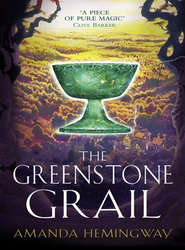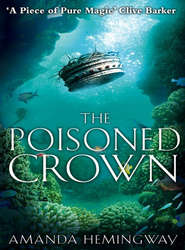По всем вопросам обращайтесь на: info@litportal.ru
(©) 2003-2024.
✖
Prospero’s Children
Автор
Год написания книги
2018
Настройки чтения
Размер шрифта
Высота строк
Поля
Slightly to her surprise, she fell asleep immediately, untroubled by nightmares.
She woke abruptly in the small hours to find herself sitting up in bed, intensely alert, her nerve-endings on stalks. The curtains were half drawn but the space between was merely a paler shade of black, barely discernible against the velvet dark of the room. There was no wind and the absolute quiet, without even a distant rumour of traffic, was something to which she had not yet become accustomed. The silence had a quality of tension about it, as if the night itself were holding its breath, waiting for a board to creak, a pin to drop, the warning screech of a bird. Fern’s pulse beat so hard that her whole body seemed to shake with it. And then came the snuffling, just as she had expected, horribly familiar and so loud it might have been directly below her window-sill. The rasping, stertorous breath of some creature that left never a print, an incorporeal hunter who had no existence except to scent its prey. The reluctance that held her back she recognised as fear, a fear that was not only inside her but all around her, a dread that was part of the room itself: she had to thrust it aside like a physical barrier. The floor made no sound beneath her tread; the window, thanks to Mrs Wicklow, was already ajar. She leaned out into the night.
There was something at the foot of the wall, something that was darker than the surrounding darkness, a clot of shadow whose actual shape was impossible to make out. Not a badger: the white bands on its mask would have been visible at that range. Besides, although she had no idea how large a badger was supposed to be she was sure this must be larger, larger than a fox, larger than a sheepdog. It moved to and fro, to and fro, as if worrying at the wall; then suddenly it stopped, and the sniffing was accompanied by a furious scrabbling, the unmistakable sound of paws burrowing frenziedly in the soil, as though seeking to unearth the very foundations of the house. Afterwards, Fern knew she must have made some slight noise to betray her presence. The thing below her froze, and lifted its head. She saw neither form nor feature, only the eyes, slanting ovoids filled with a glow that mirrored nothing around them, a livid flame that came only from within. The terror that rushed over her was beyond all reason, a wild, mindless force not pushing her back but pulling her down, down towards the ground and the waiting eyes. With a vast effort of will she wrenched herself free—and then she was back in her room, latching the window with unsteady fingers, and the silence outside was unbroken, and a board creaked in welcome as she stumbled across to her bed. She thought of going to her brother’s room to see if he was awake and what he had heard, but a great tiredness overwhelmed her and she decided it could wait till morning. Now she needed to sleep…and sleep…and by daylight the horror would be a matter for nightmare and the flower-bed would be pocked with the tracks of some mongrel stray.
But it rained before dawn, and any prints there might have been were washed away.
Fern went to the window as soon as she got up, and there was Will searching the ground, still in his pyjamas and slippers: the latter would be soaked through. ‘Come in and get dressed,’ she called. And: ‘Have you found anything?’
‘No. The rain was too heavy.’ His upturned face was curiously solemn despite a lavish smudge of dirt. ‘You heard it too?’
‘Yes. Come on in.’
He disappeared through the back door and Fern’s gaze lifted automatically to the path straddling the hillside. In the grey morning light there could be no mistaking what she saw. The Watcher had gone.
‘It wasn’t a badger,’ said Fern over breakfast. ‘There were no markings. It was big, and dark: that’s all I could see.’ She didn’t want to mention the reasonless terror that had tried to drag her from the window. Fern disliked both terror and unreason.
‘A dog?’ Will suggested.
‘Maybe.’
‘A wolf?’
‘There aren’t any wolves left in Britain.’
‘It could have escaped from a zoo,’ Will theorised, ‘only…’
‘Why would it want to get into the house? An escaped wolf would be out on the moors killing sheep—supposing it was a wolf, which I doubt. Anyway, I don’t think there are any zoos near here,’
There was a short pause filled with the crunching of cereal. ‘When you have eliminated the impossible,’ Will pronounced eventually, ‘whatever remains, no matter how improbable, must be the truth. Sherlock Holmes. Conan Doyle was a great believer in the supernatural. And that’s what we’re left with. There’s something strange going on, something to do with this house. I thought so all along. So did you really, only you’re so grownup and boring that you won’t let yourself believe in anything any more. Remind me not to grow up if that’s how it takes you. Did you know that they’ve conducted experiments in telekinesis in the laboratory? Did you know that there are alternative universes round every corner? Did you know—’
‘Shut up,’ said Fern. ‘I’m not boring, just sceptical. That’s healthy.’ And: ‘Did you know…did you know there’s a boulder on the hill behind the garden that’s shaped like a seated man, and sometimes it’s there, and sometimes it isn’t? It’s been there all weekend—always in the same place—and this morning it was gone. How’s that for a did-you-know?’
‘Perhaps it is a man,’ Will said uncertainly, baffled by the introduction of a new element in the situation. ‘Perhaps it’s a tramp.’
‘It’s a rock,’ said Fern. ‘There’s nothing wrong with my eyesight. It sits there for days, in all kinds of weather, like a rock is supposed to. I think it’s watching us.’
‘Rocks don’t watch,’ Will pointed out.
‘This one does.’
‘It all centres on the house,’ Will reiterated. ‘It could be something to do with the stuff Great-Cousin Ned picked up on his travels. Maybe there’s a magic talisman hidden in the attic, or an amulet, or the green eye of the little yellow god, or—what about that chest? It must be in there—whatever it is.’
‘Too obvious.’
‘Well, we ought to look. The key should be around somewhere.’
An arrested expression appeared on Fern’s face. ‘I don’t know if it’s relevant,’ she said slowly, ‘but Mrs Wicklow said there was a woman here asking about keys, before Great-Cousin Ned died. She was in the antiques business.’
‘She must have known about the chest.’
‘How?’
They spent the morning rooting among the jumble in the attic, finding neither talisman nor key but an assortment of items which Will at least considered promising, including an evil-looking curved knife, a devil-mask which was probably African, a hookah happily empty of opium, and an antiquated map of the Indian sub-continent with elephants, tigers, maharajahs and palaces drawn in where appropriate. Also a great deal of dust and several spiders, the largest and leggiest of which sent Fern into retreat, claiming it was time she checked out the study. Unfortunately, the most interesting feature of Ned Capel’s sanctum was a mahogany writing desk the top of which proved to be locked and, like the chest, keyless. ‘Damn,’ said Fern, who had been brought up to moderate her language. ‘I bet all the keys are in one place. The question is where.’ Her sweat-shirt, she noticed, had acquired several dust-smears as a result of her foraging, and she went to her room to change it. She had no intention of returning to the attic that day.
A routine glance out of the window showed her a sky of gunmetal grey and rain blowing in waves across the bleak landscape. Her gaze shifted—then switched back again. Seconds later she was running down the stairs, kicking off her sandals at the bottom with uncharacteristic carelessness. In the hall, she plunged her feet into an old pair of galoshes, snatched Robin’s Barbour from the peg, and crammed on her head a shapeless waterproof hat which had formerly belonged to Ned Capel. Then she ran out of the back door and through the garden to the gate. The latch was stiff from infrequent use and the wood had swollen in the wet: it took a hard thrust of her shoulder to open it. The oversized boots slopped around her feet as she scrambled up the path. The wind swept across the hillside unhindered. And then she was standing in front of him with the water dripping off her hat-brim and her unfastened jacket letting the rain soak through her sweat-shirt. He no longer resembled a boulder, though there was something rock-like about his absolute stillness and the patience it implied. He wore a loose, bulky garment with a pointed hood overhanging his face: the material was heavy and laminated with long weathering, its brindled hues at once earth-coloured and stone-coloured, moss-patched and grass-grimed. Under the hood she saw a countenance as battered as the coat, with sparse flesh on strong bones and wind-worn, sun-leathered skin gathered into wrinkles about the mouth and eyes, some of them for laughter, some for thought, many for grimness and sorrow. But it was the eyes themselves which held her: they were green and gold and brown like a woodland spring and they sparkled brighter than the rain, so bright that they seemed to pierce the walls of her mind and see into her very soul. And after the first shocked recoil her soul opened in response, and her life changed forever. It was as if the personality she had made for herself, matter-of-fact, positive, conscientiously hidebound, began to peel away like a chrysalis and a different Fernanda, wet-winged and shy, poked a tentative antenna into the unfamiliar air. In that moment she realised that she did not know herself, she never had, and all her certainties had been merely the pretence of a child afraid of maturity; but ignorance did not frighten her now, for he knew who she was, and what she was, and in that knowing she could be at ease. She said ‘Hello’, and he said ‘Hello’, and their greeting dissolved the walls of her little world, and let in the unimaginable from Outside.
‘You took your time.’ the Watcher went on. He studied her thoughtfully, seeing a girl with a raindrop on her nose—a very young girl—small for her age, her face heart-shaped, her features delineated with the precision and clarity of a pen-and-ink drawing. The wind slipped under her hat-brim, tugging it back from her forehead, showing hair that was leaf-brown and close-cut, the would-be fringe dividing obstinately into a widow’s peak above her brow. Her eyes were wide and wide-set, their grey veined with celadon, and even in that instant of her mind’s opening he glimpsed depths that were incalculable, an intelligence that would always be wary. He had made her trust him, an elementary manoeuvre, but she would not hesitate to return to doubt if—and when—he let her down.
‘You looked like a rock,’ she said accusingly.
‘It’s useful,’ he replied. ‘Nobody wonders what you’re up to, if you’re a rock. No questions, no trouble. There’s nothing as unremarkable as a rock.’
‘It isn’t possible,’ said Fern, but the conviction was gone from her voice. ‘I saw the rock.’
‘Appearances can deceive,’ the Watcher said. ‘You see many things which are not there. A mirage, a reflection, a star that died thousands of years ago. You should trust your instinct, not your eyes. You knew me long before today.’
Fern did not attempt to answer that. ‘You’ve been spying on us.’
‘Observing,’ he corrected gently. ‘Fortunately, I am still an observant man, whatever else I may have lost. I seem to have spent centuries just watching.’
She was not entirely sure he was exaggerating. ‘That’s how I thought of you,’ she said. ‘The Watcher.’
‘It’s appropriate,’ he said. ‘I have grown very tired of it, over the years. There are too many things that need watching, and far too few of us to keep watch. Have you found it yet?’
‘Found what?’
‘What you are looking for.’
‘I don’t know what I’m looking for,’ Fern pointed out.
‘A profound philosophical statement. Not many people do, and if they did, it would be far worse. To find what you seek would be an anticlimax, to fail, a tragedy. But I am talking concepts, which is beside the point. Here, there is clearly something specific to be found. There has been a certain amount of attention focused on this house for some time: callers who were not what they seemed, prowlers by night, some human, some less so. Which reminds me, next time you hear noises in the dark, curb your curiosity. It would be safer.’
‘You saw it,’ Fern said. ‘That creature last night. What was it?’
‘Something which should not have been there. Whoever sent it made a thoroughly unsuitable choice of instrument. Don’t worry too much: even if it finds an opening, it can’t come in, not without being invited. The ancient law still stands. Ignore it and it will go away.’
‘Are you sure?’
‘No. It would be rash to be too sure. But this thing was ill-chosen for our hunt: the sender may well have selected it simply to show that he—or she—has the power to summon such beings.’ He rubbed his finger along the crooked bridge of his nose in a gesture of reflection. ‘His next move should be more practical. I hope.’
‘Whose next move?’ Fern demanded.
‘I don’t know. I know very little right now. There are so many possibilities. It could be someone working alone, seeking self-aggrandisement, personal power—alas, we all want those. It could be an agent or emissary. It depends what we’re looking for. There are certain indications.’ His eyes seemed to dim and then brighten again, their light fluctuating with the vagaries of memory. ‘Something was lost, long, long ago, before the beginnings of history: few remain who would recognise it, fewer still who would know the secret of its use. When it was recovered the recipient thought it an object of no value, the symbol of a cheat; his family kept it as they would keep a grudge, passing it on with legend and moral attached, until a young bride traded it to a tinker for a knot of ribbons. He stole a kiss as well, which was not part of the bargain; they said she looked coldly on her husband ever after. The tinker took his purchase to a collector of such things, sensing its mystery if not its power, a backstreet alchemist one eighth sorcerer, seven-eighths charlatan. They studied it, he and his apprentice, scanning the smoke for visions and peering into crystal balls, learning the sort of things that you learn from staring at smoke and Venetian glassware. The alchemist also dealt in love potions and poisons—not very successfully: his potions were over-optimistic and his poisons half-hearted. Unfortunately, a dissatisfied client among the warring nobility decided to take his revenge: the alchemist was beaten senseless, his lodgings ransacked, his possessions commandeered. The object was lost again, and never found.’ He paused, sighed, as indifferent to rain and wind as the rock he had chosen to imitate. Fern was reminded of a venerable hippy, beyond the reach of marijuana or hallucinogen, looking back with cold eyes on the psychedelic phantoms he once pursued. She was damp and chilled; but she did not move. ‘We searched for it,’ he went on, ‘long after, when we learnt its importance, but it was too late. The feuding families of that time had hidden their treasures so efficiently that even their descendants could not find them. They left clues, and ciphers, but the clues were mislaid and the ciphers indecipherable. The trail had vanished. And then, about twenty years ago, a famous chalice was sold at auction—one that had gone missing during the relevant period. Apparently it had been retrieved in the last great war when a bomb demolished the wall concealing a secret vault. I could not trace the minor items which might have been found with it, but I imagine a traveller collecting flotsam could well have bought one of them for a few pounds from a market stall. It seems a likely theory.’
‘Great-Cousin Ned,’ Fern said. ‘And then? How did you find him?’
‘He was found: I don’t know how. A chance meeting; a spell—it doesn’t matter. The interest of others drew me. This thing could be here—may be here—if it is, you must get to it first.’










